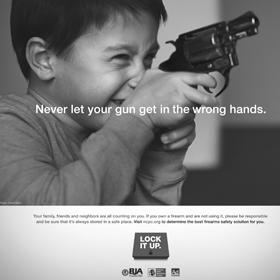
A few years back our family was rocked by the suicide of two teenage boys within 24 hours of each other. In both cases, the gun used belonged to a family member. Sadly, this is all too common.
In fact, studies show gun availability is a risk factor for youth suicide in the United States and that most suicide attempts using a firearm involve a weapon owned by a parent or other family member. For this reason the NC Division of Social Services urges foster parents not to keep firearms in the home. Not inclined to agree? Read on…
Suicide attempts using a firearm are 85-90% successful. In contrast, other means, such as cutting or poisoning, are 1-2% successful. Studies also show that only 10% of those who seriously attempt suicide and fail are likely to eventually die from a subsequent attempt (Harvard Injury Control Research Center, 2017).
Considered together, these studies show there is strong support for the assertion that it is better not to keep firearms in your home. Keeping firearms out of the home dramatically reduces the risk of your children successfully ending their own lives.
If families choose to store firearms at home, strict vigilance and storage rules must be followed. If you suspect your children (or anyone, for that matter) may be at risk of harming themselves, the first step in prevention is to make firearms unavailable by temporarily removing guns from your home. Do not make the mistake of thinking that hiding a gun is enough.
The safety controls foster parent gun owners in our state must use are little more than common sense. The following list is an excerpt of the requirements for North Carolina foster families:
- Explosive materials, ammunition, and firearms shall each be stored separately, in locked places.
- Firearms must be kept securely locked. Consider adding a trigger lock for additional security.
- Ammunition for the firearm must be locked up and stored separately from the firearm.
- If a gun cabinet is used to store both firearm and ammunition, the cabinet must have separate locked areas for the firearm and the ammunition (NC DSS, 2014).
As an avid sportsman I’ve been storing my guns in a safe in my home. But as a father to children who are at increased risk of self-harm, the education I got in researching this article has caused me to pause and reconsider that decision. If you’re like me and have or will have kids in your home who could be at risk, I encourage you to do the same.
Bob DeMarco is an adoptive parent in North Carolina.


